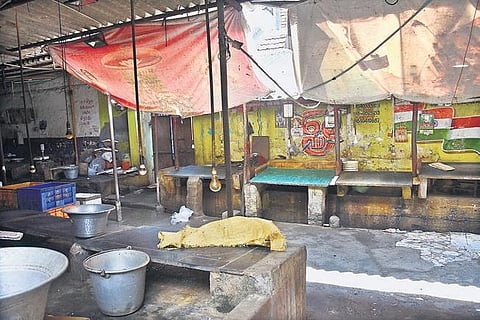

CHENNAI: The coronavirus outbreak has prompted the government to devise plans for regulating meat sale across the State. This includes completely restricting the killing of animals for consumption at unlicensed slaughter houses.
Though local body Acts, Food Safety Act and Tamil Nadu Pollution Control Board norms mandate that animals be killed at licensed slaughter houses, the rules remain only on paper. Given that a majority of slaughter houses outside Chennai function without dedicated veterinary doctors, it is estimated that more than 60 per cent of meat is received from unauthorised slaughter houses. “As of now, there is no mechanism to ensure the quality and safety of all the meat sold. The Food Safety Act and other regulatory norms may likely be implemented after lockdown period ends,” a highly placed official from the health department said.
There are 182 slaughter houses in the State. While the Greater Chennai Corporation runs three slaughter houses at Vepery, Perambur and Purasawalkam, more than 500 slaughter houses have been functioning illegally in the city and its outskirts, said official sources. “In rural and semi-rural areas, butchers kill animals in the backyard of their meat shops without ascertaining the health condition of the animals. Also, quality of meat at many places is not certified by veterinarians,” said a senior animal husbandry department official.
While licensed slaughter houses run by corporations and municipalities face an infrastructure crisis, as they stink and have improper drainage facilities, the illegal slaughter houses pose a huge health risk, added the official.
It’s reliably learnt that the government considered closing all meat shops till April 14 in view of the rise in COVID-19 cases. Lack of ‘social distancing’ at fish markets and meat stalls too led the government to mull such a decision. However, the proposal was dropped as it could create panic among people, sources said. “Sudden closure of meat shops may have a severe impact on the people involved in the business. So, powers were given to Collectors to decide on running meat stalls, considering the local conditions, hygienic levels and COVID-19 cases,” explained the official.
A senior food safety official said, “Provisions of Food Safety Act with respect to meat consumption was never implemented in letter and spirit. We have been creating awareness among traders. Wherever meat stalls were relocated in the past few days (Salem, Erode and few other districts), we ensured that animals were killed only at licensed slaughter houses.”
A Gnanasekaran, Director of Animal Husbandry and Veterinary Service, said, “There is no evidence for spread of coronavirus through consumption of egg, mutton, chicken or beef. Slaughter houses are being maintained by the local bodies. As of now, decision on closure of meat stalls will be taken by Collectors.”
Law and regulations for meat consumption in State
■ Slaughter House Rules, 2001
■ Prevention of Cruelty to Animals Act, 1960
■ Tamil Nadu Animal Preservation Act
■ National Green Tribunal Act
■ Food Safety and Standards Act
■ Rules of Tamil Nadu Pollution Control Board